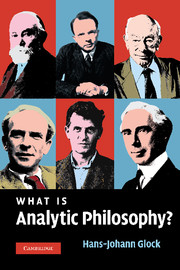5 - Doctrines and topics
Published online by Cambridge University Press: 05 June 2012
Summary
Many readers will feel that up to this stage I have been beating about the bush. In so far as analytic philosophy constitutes a genuine philosophical movement, tradition or current, shouldn't its proponents be united by certain philosophical interests or views? It is high time to spare a thought for the rather obvious suggestion that analytic philosophy is characterized by certain topics and/or doctrines. We might call such topical or doctrinal conceptions of analytic philosophy ‘material’, to distinguish them from formal (methodological and stylistic) conceptions to be considered in the next chapter.
Philosophers have a notorious penchant for disagreement, and closer inspection tends to reveal diversity even within paradigmatic schools or movements. In the case of analytic philosophy, this general phenomenon is particularly pronounced. Most commentators would concur with Soames' denial that analytic philosophy is a ‘highly cohesive school or approach to philosophy, with a set of tightly knit doctrines that define it’ (2003: xii). Even with respect to specific currents, contemporary scholars go out of their way to stress that they involved greater variety than commonly assumed. Both Hacker (1996: 228–9) and Warnock (1998) point out that the label ‘Oxford ordinary language philosophy’ was only used by opponents, and that post-war Oxford philosophy did not constitute a uniform school. Similarly, historians of logical positivism maintain that it was not the monolithic philosophical faction of popular repute (Haller 1993; Uebel 1991).
- Type
- Chapter
- Information
- What is Analytic Philosophy? , pp. 115 - 150Publisher: Cambridge University PressPrint publication year: 2008



